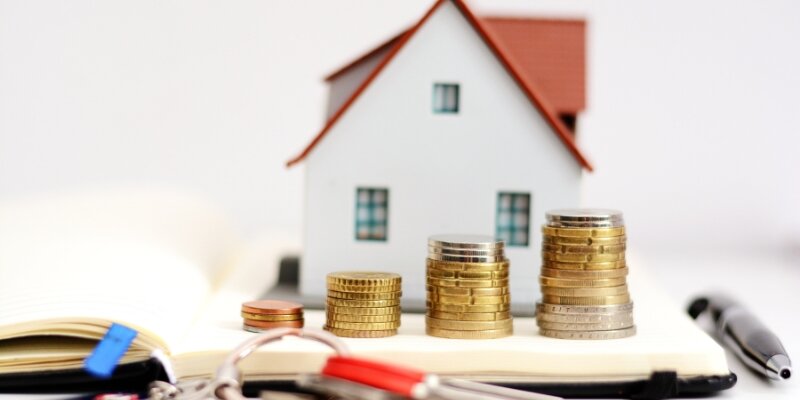
What Happens To Equity When I Sell My House?
Selling your house is a significant financial decision, and one of the most important factors to consider is what happens to your equity when you do so. Equity represents the portion of your home’s value that you truly own, and understanding how it is affected during the home-selling process is crucial. In this comprehensive guide, we will break down the key aspects of what happens to your equity when you sell your house.
Understanding Home Equity
Before diving into the sale process, it’s essential to understand what home equity is. Equity is the market value of your home minus the outstanding balance on your mortgage or any other encumbrances. It represents the portion of your home that you truly own. Equity builds over time as you pay down your mortgage.
Here’s how it works:
- Market Value: The market value of your home is the estimated price your property would sell for in the current real estate market. It can fluctuate over time based on factors such as location, local market conditions, and property improvements.
- Outstanding Mortgage Balance: This is the amount you still owe on your mortgage. As you make monthly loan payments, the outstanding balance decreases over time.
To calculate the equity in your home, subtract the outstanding loan balance from the current value of your home. For example, if your home is valued at $300,000 and your loan balance is $200,000, you have $100,000 in home equity. Equity is the amount that represents a valuable asset that can be utilized in various ways, including as a down payment on a new home or as collateral for loans or lines of credit. Understanding your home equity is the first step in making informed decisions about selling your property.
Dealing with a Home with Negative Equity
In some situations, homeowners may face negative or low equity, which occurs when the outstanding loan balance exceeds the current market value of the home. When selling a house with little equity, you will likely need to bring additional funds to the closing table to cover the shortfall. When selling a house with negative or low equity, here are some other options to consider:
- Short Sale: This involves reaching an agreement with the mortgage lender to accept less than the full amount owed on the mortgage, allowing you to sell the property and satisfy the debt.
- Selling Subject to the Existing Mortgage: This approach involves transferring ownership to the buyer while leaving the existing mortgage in place. The buyer takes responsibility for making mortgage payments, but the original homeowner’s name remains on the mortgage. It can be a solution for those who need to sell a home with negative equity or facing a situation such as foreclosure and are willing to find a buyer willing to assume the monthly payments.
Determining Your Home’s Market Value

To assess your amount of equity accurately, you need to determine your home’s current market value. There are several methods to do this effectively:
- Professional Appraiser: Hiring a professional appraiser is one of the most accurate ways to determine your home’s market value. Appraisers are trained to evaluate various factors, including the condition of your home, recent comparable sales in your area, and market trends. They provide an unbiased and detailed valuation of your property.
- Comparative Market Analysis (CMA): Your real estate agent can prepare a Comparative Market Analysis. This report assesses your property’s value by comparing it to similar homes that have recently sold in your neighborhood. While not as precise as a professional appraisal, a CMA can give you a reasonably accurate estimate of your home’s value.
- Online Valuation Tools: There are numerous online tools and websites that can provide estimated home values. These tools use algorithms and publicly available data to offer a rough estimate of your home’s market value. While convenient, it’s important to remember that these estimates can sometimes be imprecise and should be used as a starting point for your research.
Accurate valuation is essential as it directly impacts your equity. The more precise your assessment of your home’s market value, the better you can understand the financial implications of selling your property and make informed decisions throughout the process.
Paying Off The Mortgage
One of the primary considerations when selling your home is paying off your remaining mortgage. The process to pay off your mortgage debt typically involves the following:
- Settlement from Sale Proceeds: When you sell your home, the remaining loan balance is deducted from the sale proceeds. This process is usually facilitated by the closing agent or escrow company. If your home’s selling price is higher than the mortgage loan balance, the surplus funds belong to you and represent your equity. The higher your equity, the more money you’ll receive after settling the mortgage.
- Options for Handling Negative Equity: In cases where your home’s selling price is lower than the loan balance, you may encounter negative or low equity. To address this, you have a few options:
- Bringing Additional Funds: If you have the financial means, you can bring the necessary funds to the closing table to cover the shortfall.
- Negotiating with the Lender: In situations of negative or low equity, you can discuss options with your mortgage company. One potential solution is a short sale, where the lender agrees to accept less than the full amount owed on the mortgage, allowing you to sell the property and satisfy the debt.
- Selling Subject to the Existing Mortgage: As mentioned previously, some homeowners may explore the option of selling their home “subject to” the existing mortgage. This approach involves transferring ownership to the buyer while leaving the current mortgage in place. The buyer takes responsibility for making the mortgage payments, but the original homeowner’s name remains on the mortgage.

Why Sell Your House To TX Cash Home Buyers?
1. You Pay Zero Fees
2. Close Quickly or the date of your choice
3. Guaranteed Offer
4. No repairs required, we buy as is
5. Less Hassles!
Call Now (281) 595-7550 Send Text
Covering Costs To Sell A House
When selling your house, you’ll encounter various costs that impact your overall equity. These costs include:
- Realtor Commissions: Typically, sellers pay a commission to their real estate agents. This fee is usually a percentage of the final sale price. However, if you choose to sell your house directly to an investor, you might bypass this cost since they often purchase properties without the involvement of real estate agents.
- Closing Costs: Closing costs cover various expenses related to the sale, such as title insurance, property transfer taxes, and administrative fees. When selling to a traditional buyer, these costs are typically shared between the buyer and the seller. In the case of selling to an investor, they may be more inclined to cover the standard closing costs, which can alleviate some of the financial burden on your end.
- Repairs and Renovations: To make your home more appealing to potential buyers, you may need to invest in repairs or renovations. While these expenses are an investment in securing a higher sale price, they should be factored in when calculating your net proceeds.
These costs are subtracted from your home’s sale price before determining your equity. The net proceeds you receive ultimately depend on various factors, including the nature of the buyer (investor or traditional buyer) and the negotiation of expenses in the sales agreement.
Other Articles You Might Enjoy:
- Did You Inherit a House with a Mortgage? Learn Your Options
- VA Construction Loan Lenders: Building Your Dream Home
- What Happens If I Sell My House for Less Than I Owe on the Mortgage?
- How to Avoid Negative Equity on Your House: A Comprehensive Guide
- Exploring Mortgage Options: What Happens to Equity When You Sell A House?
Calculating Your Net Proceeds When You Sell A Home With A Mortgage
To determine the exact amount of equity you’ll receive from the sale of your home, you’ll need to calculate your net proceeds. This figure is derived by deducting the following from the sale price of your home:
- Outstanding Loan Balance: This is the remaining amount you owe on your mortgage. It’s typically one of the first deductions made when you close the sale.
- Selling Costs: Selling a home involves various expenses, such as real estate agent commissions, closing costs, and potential repair or renovation expenses. These costs are subtracted from the sale price as well.
The net proceeds represent the actual amount of money you’ll have available after settling your mortgage and covering all selling-related costs. This is the final figure that will determine how much of your home’s equity you can put to use in your next financial move, whether it’s buying a new home, investing in other opportunities, or simply bolstering your financial security. Understanding your net proceeds is crucial for making well-informed financial decisions during the selling process.
Using Your Equity for Your Next Home

If you plan to buy another house, your equity can be a valuable resource. Here are some key points to consider when using your equity as a down payment for your next home:
- Larger Down Payment: The more equity you have from the sale of your current home, the larger the down payment you can make on your next property. A larger down payment can have several benefits, including a lower loan-to-value ratio, which may lead to more favorable mortgage terms. Lenders often offer better interest rates and lower monthly payments to borrowers with substantial down payments.
- Reducing Mortgage Costs: By using your equity to make a significant down payment, you can potentially reduce your new mortgage’s interest rates and overall costs. This can lead to more manageable monthly mortgage payments and long-term savings.
- Home Affordability: Your equity can help you afford a home that might have been out of reach without a substantial down payment. It can also make it easier to qualify for a loan, as lenders often view borrowers with a higher down payment more favorably.
- Private Mortgage Insurance (PMI) Avoidance: With a substantial down payment made possible by your equity, you may avoid the need for private mortgage insurance. PMI is typically required when the down payment is less than 20% of the home’s purchase price, and it adds to your monthly housing expenses. By using your equity for a larger down payment, you may sidestep this cost.
Releasing The Equity In A Home
If you’re not planning to purchase another home right away or simply want to leverage your equity for other financial purposes, there are several equity release options to consider:
- Cash-Out Refinancing: This option involves refinancing your existing mortgage for an amount that exceeds your current mortgage balance. The difference between the new loan amount and your old mortgage is paid out to you in cash. Cash-out refinancing allows you to access a lump sum of your home’s equity, which can be used for various purposes, such as home improvements, debt consolidation, or other investments.
- Home Equity Lines of Credit (HELOCs): A HELOC or home equity loan is a revolving line of credit that uses your home’s equity as collateral. It works much like a credit card, allowing you to borrow funds up to a predetermined limit. You can access the money as needed and pay interest only on the amount you’ve borrowed. HELOCs provide flexibility and are often used for ongoing expenses, such as home renovations, education costs, or emergency funds.
- Reverse Mortgages: Reverse mortgages are typically available to homeowners aged 62 or older. They allow you to convert a portion of your home’s equity into loan proceeds. Unlike traditional mortgages, with a reverse mortgage, you receive payments from the lender rather than making monthly payments. The loan is repaid when you sell the home, move out, or pass away. This option can provide additional income or funds for specific needs without the need to move.
Maximizing Your Equity When You Sell Your House
To maximize your equity when selling your house, consider:
a. Staging your home for a higher sale price. b. Completing necessary repairs or upgrades. c. Setting a competitive asking price.
The Bottom Line: What happens to the equity when you sell your home
In conclusion, understanding what happens to your equity when you decide to sell your home is crucial for making informed financial decisions. Your equity is a valuable asset, and how you manage it during the selling process can impact your future financial stability and homeownership opportunities. Ensure you calculate your equity accurately and consider the best strategies to make the most of it in your future endeavors.
FAQ
- Where does equity go when you sell?
Equity goes to you, the homeowner, when you sell your house. It represents your ownership interest in the property, and the proceeds from the sale, after paying off the mortgage and selling costs, are yours to use as you see fit. - How much equity will I get if I sell my house?
The amount of equity you’ll receive when selling your house depends on the sale price, your outstanding mortgage balance, and any associated selling costs. The higher your sale price and the lower your mortgage balance and expenses, the more equity you’ll retain. - What can I do with equity from a home sale?
You can use your home equity for various purposes, such as buying a new home, investing in other opportunities, consolidating debt, financing home improvements, or bolstering your financial security. The choice depends on your financial goals and needs. - Can I use equity for a down payment on a new home?
Yes, you can use the equity from the sale of your current home as a down payment on a new property. A larger down payment can potentially lead to better mortgage terms, lower interest rates, and reduced monthly payments.
Disclaimer:
The content provided on this blog is for informational purposes only. We are not attorneys or tax professionals. For personalized legal or tax advice, please consult with a qualified professional.
Written by Lisa Martinez, Founder of TX Cash Home Buyers

About The Company
TX Cash Home Buyers helps Texas homeowners sell quickly and simply — even in tough situations like repairs, inherited homes, or financial stress. Founded by Lisa Martinez, we’re known for our local experience, fair offers, and commitment to guiding sellers through off-market sales with clarity and care.




